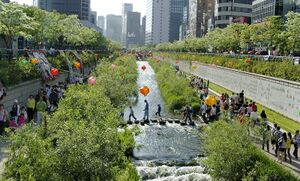
Keep updated with, and share the latest news from, about and of interest to community agency networks (CANs) and community groups' activism for climate, environment and many other sustainability topics across South Korea.
 South Korea’s climate law violates rights of future generations, court rules, theguardian.com (Aug 29, 2024)
South Korea’s climate law violates rights of future generations, court rules, theguardian.com (Aug 29, 2024)
 How South Korea’s composting system became a model for the world, latimes.com (Aug 24, 2023)
How South Korea’s composting system became a model for the world, latimes.com (Aug 24, 2023)  Velotopia (meaning a paradise for bike-riders) is currently being built in Amsterdam, the Ruhr in Germany and South Korea, The Daily Alternative (Feb 08, 2023)
Velotopia (meaning a paradise for bike-riders) is currently being built in Amsterdam, the Ruhr in Germany and South Korea, The Daily Alternative (Feb 08, 2023)
2015-2020[edit | edit source]
In the world’s first ‘Coronavirus elections’, South Korea voted for climate action. In the first national elections in the time of Covid-19, South Korea’s Democratic Party won in a landslide – after putting forward a bold Green New Deal plan in their manifesto. Apr 23, 2020...[1]
- Using ancient values to solve modern problems at the Eunpyeong Sharing Center, Dec 17, 2019...[2]
- Korea: New presidential candidate promises universal basic income, Feb 8, 2017...[3]
- South Korea's Plan to Have World's First Carbon-Free Island, Jun 7, 2016...[4]
- In South Korea, An Innovative Push to Cut Back on Food Waste, May 20, 2015...[5]
- Here's what happened when a neighborhood decided to ban cars for a month, May 11, 2015...[6]
References
2009-2013[edit | edit source]
“The Sharing City, Seoul” Project, Sharing City – a new city paradigm, January 24, 2013
- On 20 September 2012, the Seoul Metropolitan Government disclosed its plan for promoting the “Sharing City, Seoul” project, which includes 20 sharing programs and policies for generating or diffusing “sharing city” infrastructure after declaring the “Seoul as a Sharing City” vision. The Metropolitan Government regards “sharing city” as a new alternative for social reform that can resolve many economic, social, and environmental issues of the city simultaneously by creating new business opportunities, recovering trust-based relationships, and minimizing wastage of resources. In particular, the city plans to deploy secondary sharing infrastructure from now on to enhance the usefulness of idle resources such as space, objects, and talents since its urban policies have concentrated on constructing primary sharing infrastructure to date, such as roads, parking lots, schools, and libraries. Parallel to the above, the Metropolitan Government plans to implement policies of opening public resources to the citizens by having the public sector take the initiative while focusing on the implementation of policies that respect and promote private sector capabilities.[1]
- An Integrated Landscape: Yongsan National Park, May 9, 2012...[2]
- New UN facility on sustainable development opens in Republic of Korea,[3] October 19, 2011.
- Japan and South Korea launch Green New Deals,[4] January 9, 2009. South Korea's 36 projects include the creation of green transport networks, the provision of two million energy-saving 'green homes' and the clean-up of the country's four main rivers.
References